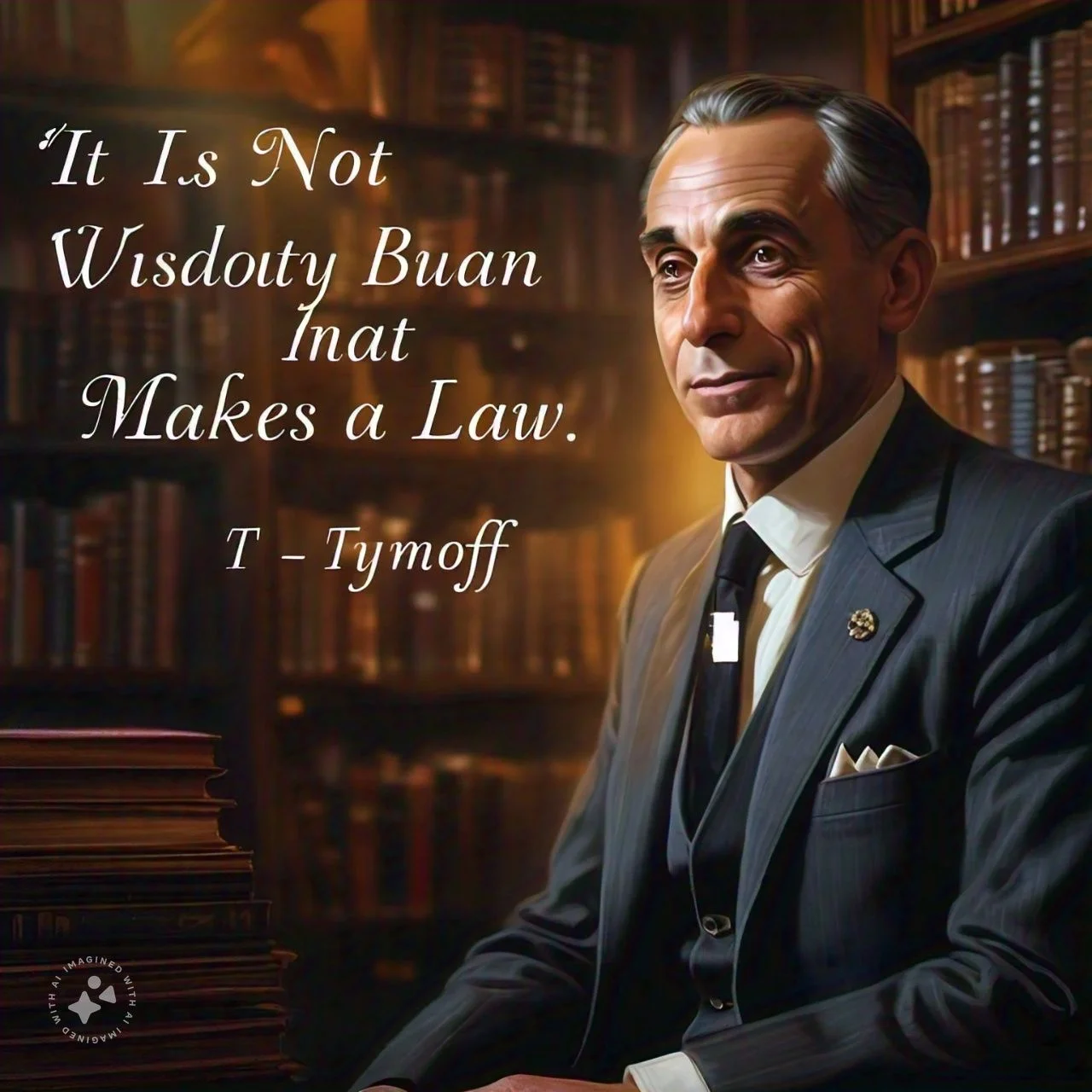
The statement, ‘it is not wisdom but authority that creates law,’ challenges conventional views on law-making. t – tymoff” offers a critical perspective on the foundations of law-making. This statement challenges the idea that laws arise from collective wisdom or ethical considerations. Instead, Tymoff emphasizes that authority, rather than wisdom, is the primary driver behind the creation of laws. This viewpoint raises important questions about the role of power, morality, and ethics in legal frameworks. In this article, we will delve into Tymoff’s perspective, explore the dynamics of authority versus wisdom in law, and examine how these elements impact society today.
The Origin of the Quote: Understanding Tymoff’s Perspective
“It is not wisdom but authority that makes a law. t – tymoff” is more than a mere statement; it reflects a philosophical critique of law’s foundations. Tymoff suggests that laws are often shaped by the interests and control of those in power, rather than by an enlightened understanding of justice. While many people perceive laws as a symbol of fairness, Tymoff’s perspective presents a different reality—one where authority frequently overshadows wisdom.
This perspective encourages us to think critically about the origins of laws and the motives behind them. Are laws really designed to benefit society as a whole, or are they instruments of authority meant to enforce the will of the few? Tymoff’s view points to the latter, questioning the role of ethical considerations and collective wisdom in the legal system.
Authority vs. Wisdom: Defining Each in the Context of Law
To understand Tymoff’s assertion, ‘it is not wisdom but authority that makes a law. t – tymoff,’ it’s essential to first differentiate between authority and wisdom in the context of law.
Authority is the power or right granted to certain individuals or bodies to create, enforce, and uphold laws. This power can come from political positions, societal roles, or legal frameworks. When laws are based on authority, they reflect the priorities and objectives of those with the power to impose them.
On the other hand, wisdom represents the judicious use of knowledge, ethics, and empathy in decision-making. Wisdom-driven laws would ideally prioritize fairness, justice, and the well-being of society. However, Tymoff argues that wisdom is often sidelined, as authority assumes a primary role in creating laws. This conflict between authority and wisdom lies at the heart of Tymoff’s statement.
Historical Perspective on Authority-Driven Laws
To understand Tymoff’s assertion, the idea behind ‘it is not wisdom but authority that makes a law. t – tymoff’ has echoed throughout various civilizations. Ancient legal systems, such as those in Mesopotamia and Egypt, were often shaped by the absolute power of rulers. For example, the Code of Hammurabi—one of the earliest known sets of laws—was decreed by the Babylonian king Hammurabi. Although it aimed to maintain order, the laws reflected Hammurabi’s authority more than the collective wisdom of the society.
Similarly, in ancient Egypt, laws were enforced by the ruling Pharaohs. These leaders held unquestioned authority, and the laws served as tools to consolidate their power. In such societies, the purpose of laws was not to foster wisdom or ethical growth but to enforce the will of the powerful. This historical context emphasizes Tymoff’s point that authority, rather than wisdom, is often the backbone of law-making.
The Debate: Should Laws Be Wisdom-Driven or Authority-Driven?
The debate between authority-driven and wisdom-driven laws is ongoing. Tymoff’s “it is not wisdom but authority that makes a law. t – tymoff” challenges us to question whether authority or wisdom should take precedence.
Wisdom-driven laws are often derived from philosophical principles, ethical theories, and the pursuit of justice. Such laws aim to promote fairness and the common good, often requiring time, deliberation, and input from diverse perspectives. However, the process of creating wisdom-driven laws is slow, as it values inclusivity over expediency.
In contrast, authority-driven laws prioritize control, efficiency, and the objectives of those in power. While these laws are often enacted quickly to address immediate needs, they may lack the depth and ethical considerations found in wisdom-driven laws. This contrast highlights the fundamental difference between laws born of wisdom and those enforced by authority.
Ethical Implications of Authority-Driven Laws
Tymoff’s phrase, ‘it is not wisdom but authority that makes a law. t – tymoff,’ highlights ethical concerns surrounding a law-making process centered on authority. When laws are created primarily by authority, there is a risk of overlooking the ethical or moral consequences of those laws.
For instance, in authoritarian regimes, laws are often established to protect the interests of the ruling class or maintain social order. These laws may restrict individual freedoms, suppress dissent, or disproportionately impact certain groups. By prioritizing authority over wisdom, these legal frameworks can lead to injustice and social division. This lack of wisdom in law-making underscores the importance of integrating ethical considerations into the legislative process.
The Role of Public Opinion and Societal Values in Law-Making
In democratic societies, the influence of public opinion and societal values can counterbalance authority in law-making. However, even in such systems, “it is not wisdom but authority that makes a law. t – tymoff” remains relevant. Elected officials are entrusted with the authority to make laws, yet their decisions are often swayed by political agendas, lobbyists, and special interest groups.
When laws are passed without genuinely considering public sentiment, they may fail to resonate with the people they are meant to serve. In contrast, laws influenced by societal values and collective wisdom are more likely to gain public support. This dynamic highlights the need to consider both authority and wisdom in creating laws that reflect societal needs and values.
Case Studies: Modern Laws Reflecting Tymoff’s Idea
Recent examples of laws driven by authority rather than wisdom support Tymoff’s assertion. Consider emergency decrees implemented during times of crisis. These laws are often enacted swiftly, prioritizing control and order over nuanced ethical considerations.
For instance, in times of political unrest, governments may impose laws that restrict protests, limit freedom of speech, or increase surveillance. These measures underscore the idea behind “it is not wisdom but authority that makes a law. t – tymoff”—that authority often takes precedence over ethical values or public opinion in moments of urgency.
Striking the Balance Between Authority and Wisdom in Law
The ideal legal framework balances “it is not wisdom but authority that makes a law. t – tymoff” with wisdom. Such balance requires systems that include checks and balances, encouraging law-makers to consider ethical implications while retaining the necessary authority to enforce laws.
In democratic nations, a separation of powers helps to ensure that no single authority can create laws unchallenged. Courts and judiciaries provide a layer of oversight, interpreting laws to align with constitutional values. This system is designed to balance authority with wisdom, promoting a legal framework that respects both the power to enforce and the need for ethical integrity.
The Role of Judiciary in Law-Making
The judiciary serves as a crucial balancing force, bringing a degree of wisdom to the application of authority-driven laws. Judges interpret laws based on legal precedents, societal norms, and ethical considerations. This judicial wisdom helps to ensure that laws serve justice and uphold societal values. Tymoff’s “it is not wisdom but authority that makes a law. t – tymoff” remains relevant here, as the judiciary mitigates the risk of authority-driven laws becoming oppressive or unjust.
Through careful interpretation, judges can influence how laws are applied, ensuring they align with broader ethical standards. This dynamic reflects the importance of judicial wisdom in balancing the authority behind laws.
Public Perception and Acceptance of Laws
Laws perceived as authoritative but lacking in wisdom often face public resistance. “It is not wisdom but authority that makes a law. t – tymoff” implies that such laws, enacted without considering the public’s views, may not gain long-lasting acceptance.
Conversely, laws that resonate with societal values and ethical principles are more likely to gain support and compliance. For example, progressive laws in Nordic countries, which reflect collective wisdom, have gained high levels of public acceptance. This shows the importance of aligning authority-driven laws with societal values.
Conclusion: Redefining Law as a Product of Authority and Wisdom
The statement “it is not wisdom but authority that makes a law. t – tymoff” encourages us to rethink the foundations of our legal systems. While authority is essential for enforcing laws, wisdom is equally important to ensure these laws reflect ethical and societal values. For laws to be respected and effective, they should balance authority’s structure with the insight and fairness that wisdom provides.






